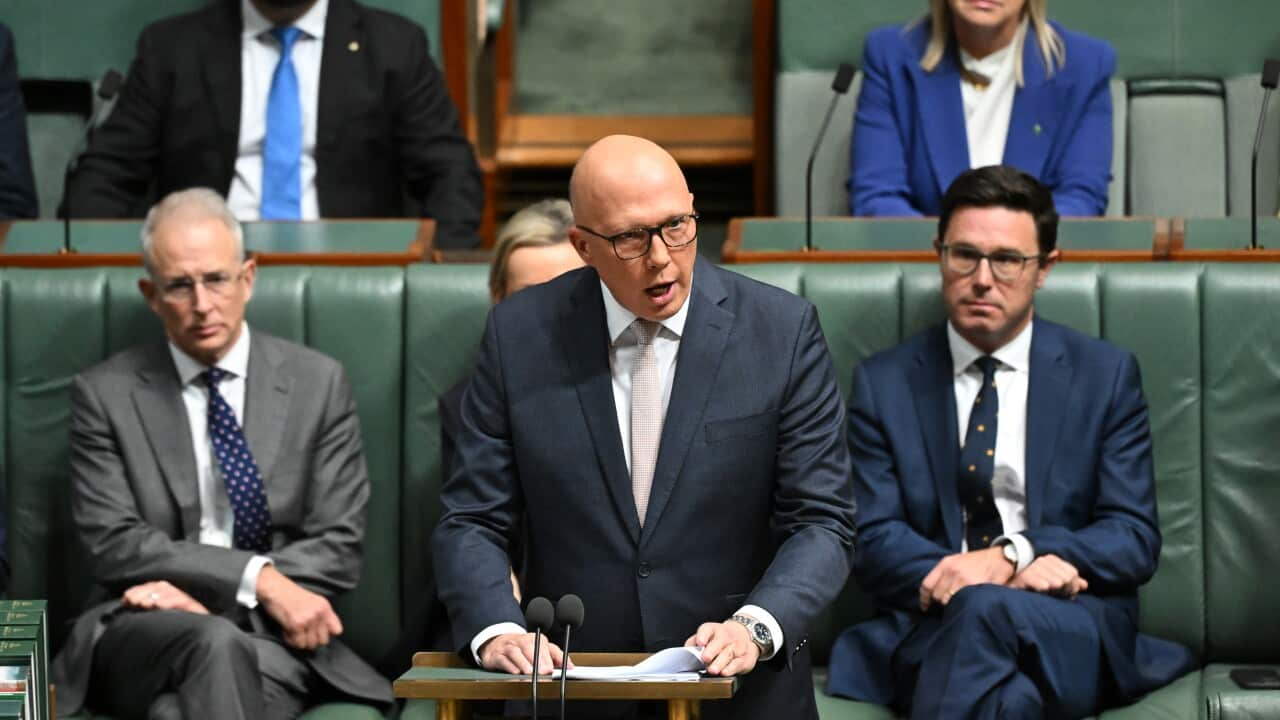Key Points
- Opposition leader Peter Dutton spoke about the number of international students trying to extend their visas.
- He described it as the "modern version of boat arrivals".
- Abul Rizvi, former deputy secretary at the immigration department, described Dutton's comments as "nonsense".
Opposition leader Peter Dutton has been criticised for describing international students trying to extend their visas as the "modern version of boat arrivals".
Dutton made the comments when asked about the rising number of international students in the country and the increase in applications for visa extensions with the Administrative Appeals Tribunal (AAT).
He claimed international students appealing for visa extensions were exploiting a weakness in the system.
"This is the modern version of boat arrivals, people have found a weakness in the system; they are exploiting the weakness," Dutton told radio 2GB host Ray Hadley.
"They obviously will be getting advice from lawyers in this space and others who have tested the system and found success and ultimately have stayed in Australia or extended their stay."
A spokesperson for Home Affairs Minister Tony Burke rejected the criticism saying the federal government would not "apologise for returning integrity to the international education system", according to The Guardian.
Abul Rizvi, former deputy secretary at the immigration department, described Dutton's comments as "nonsense".
"The boat arrival comparison is nonsense; boat arrivals come without a visa, all of these students came with a visa," Rizvi said.
"If he (Dutton) doesn't understand the difference between that, he shouldn't have been home affairs minister."

Abul Rizvi has criticised Peter Dutton's comments about international students. Source: AAP / Lukas Coch
He said all people onshore in Australia with a visa have appeal rights when they apply for a visa onshore.
He said visa holders had had this right for decades, including when Dutton was home affairs minister.
"What these people are doing is merely exercising their legal rights ... it's not a weakness in the system, it's the way the judicial system in Australia operates," Rizvi said.
"It was around the whole time that he was a home affairs minister. If he thought it was a weakness in the system, why didn't he try to fix it?"
International students and housing
In the 2GB interview, Dutton also spoke about international students and migration in connection with housing shortages.
"[The government] don't believe in a strong border protection policy and it's getting away from them, it's having a huge impact on housing," he said.
"And the fact that the prime minister has brought in a million people over the last two years and only 300,000 homes have been built ... shows that, I think, they've just lost control of the migration program."
But Parth Patel, a registered migration agent, believes international students are being unfairly placed at the centre of political debates.
"Whenever there are any crises happening in recent times, for example the housing crisis, students are penalised," he said.
"But when the government wanted people in Australia ... the government was saying 'we will be offering free student visa extensions', or they were saying 'we will be giving full-time work rights to the students'."
Patel said migrants and international students can boost the economy and help fill skill shortages in the labour market.
"It's unfair to the students, they are actually supporting the economy," he said.
"And there are a good number who are settling in Australia (during) skills shortages and having a high skillset."
How many international students are appealing to extend Australian visas?
According to the Department of Education, in the year-to-date July 2024 there were 943, 977 international student enrolments, a 17 per cent increase in enrolments on the same period in 2019.
Year-to-date July commencements are currently the highest on record at 420,751.
The Albanese government has made a series of changes to migration policy and tightened criteria for student visas.
According to data from the AAT, over 1 July to 31 August were 15,877 active appeals from students who have had their visas either cancelled or refused.
Ali Mojtahedi, principal solicitor at the Immigration Advice and Rights Centre, said a high number of appeals was a natural consequence of tightened restrictions.
"I don't think that should have come as a surprise to anybody that you're going to have more visa refusals, and naturally you're going to have more people exercising a right to seek review of those decisions," he said.
"I reject the idea that having access to a merit review is a weakness in the system. I think it's a strength of the system."
Mojtahedi said appealing a visa refusal or cancellation is a formal and thorough process for international students.
"If people decide to take up the opportunity to seek review, then that's their right," he said.
"And I struggle to see any criticism of a person exercising a right that's given to them by parliament."












